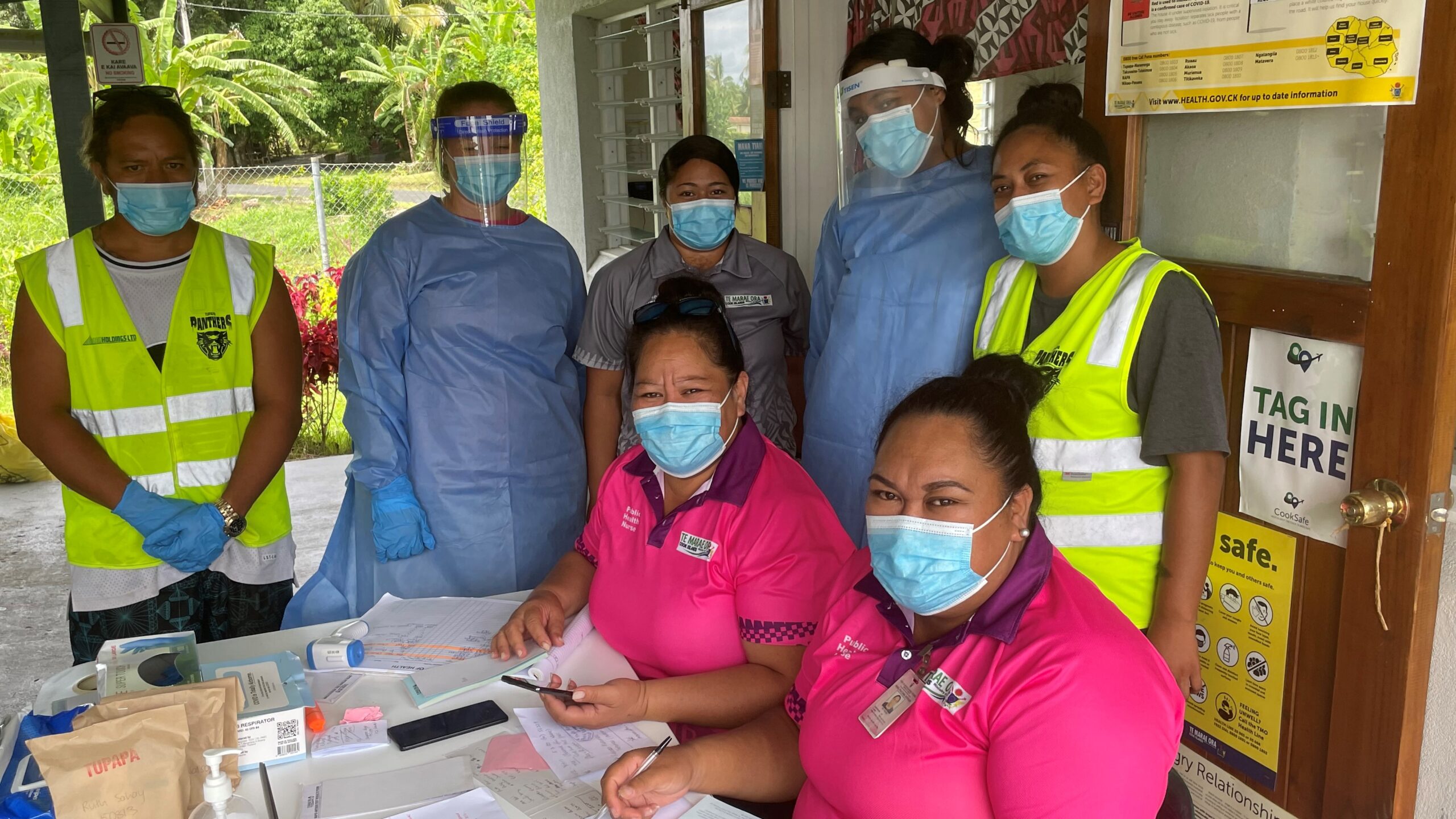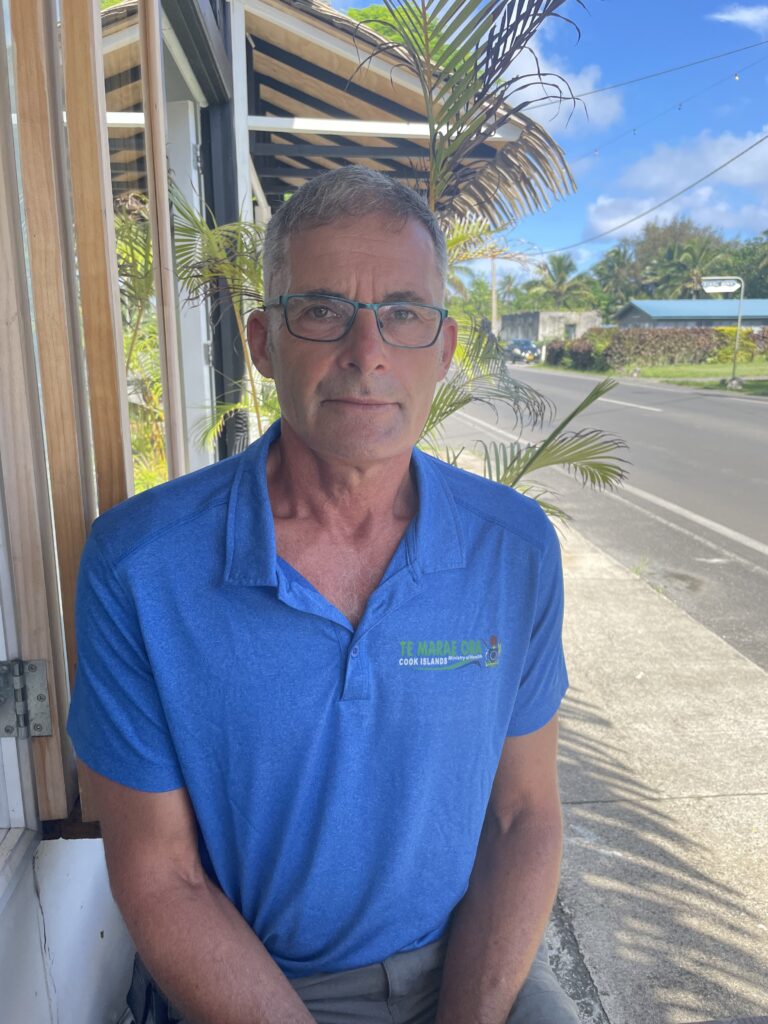Managing Covid-19 outbreak
Saturday 19 March 2022 | Written by Matthew Littlewood | Published in Features, Weekend

The Tupapa Health Clinic team with public health nurse Ake Teiotu (seated left) are part of the frontline response to the Covid-19 pandemic. MATTHEW LITTLEWOOD/22031803
Covid-19 is predicted to affect about half the population of Rarotonga over the next few weeks.
In her 21 years working in the health field, public health nurse Ake Teiotu says she had never been involved in anything as big as the Covid-19 outbreak.
“It’s spread like nothing else I’ve seen,” Teiotu says.
Covid-19 cases are increasing every day, and the response of the health authorities has been to accept there will be more to the point where up to half of Rarotonga’s population could be affected by Covid-19, and the remainder of it come into contact with the virus.
The next few weeks are going to be crucial, says Cook Islands public health advisor Dr Douglas Lush.
The number of Covid-19 cases has already passed 600, but Lush says there is a strong likelihood of case numbers reaching as high as 7000 – half the population of Rarotonga – and everyone within the island coming into contact with a Covid-19 case.
This is where the country’s high level of vaccinations could well “spread out” the daily peak numbers.
Lush says the effort made to protect the vast majority of people through the “safe delivery of three doses of the Pfizer vaccine” has been the country’s greatest achievement.
“The most important aspect was to take the advice on getting vaccinated. After being vaccinated, the best protection you have is wearing a mask,” Lush says.
“The current advice is around slowing down this outbreak so we are not inundated with serious cases at the hospital and to protect essential services.
“It really is about doing the basics.”

Teiotu, who looks after a team at the Tupapa clinic, says now that Covid-19 is in the community, the remaining people who were hesitant to get the vaccine “now want to get the vaccine”.
However, one of the biggest challenges has been to get the public to listen to the right messages.
“They’re the same messages we’ve been saying for two years now. They’re getting out there, but some people are still ignoring it.”
In order to contain the recent Covid outbreak, Te Marae Ora Ministry of Health is preparing a community-based response that hopes to “spread out” the peak and assist people who have got Covid-19.
Part of this response has been left to the Punas (island districts), which have the authority to oversee testing of Covid-19 and also the community response to those who are affected with it.
Puna leader Alexander McQuarrie says it will come down to the basics as to how the spread is managed.
“The main thing is to make sure everyone is wearing masks, display good hand hygiene, and social distance,” says McQuarrie.
“We’re going to see an explosion in cases, but if everyone does the right thing, it’s going to be manageable.”
Sel Napa, who is also a Puna leader and a Member of Parliament, says people were still being far too casual.
“When the Prime Minister asked that everyone should go and get RAT tested, everyone should get a RAT test. Our teachers are getting infected and there are people who are not sure where they got it from,” Napa says.
“We all need to be ready, because you never know when you are the next one who may test positive.”

Napa says in her village Titikaveka alone, there are 25 homes in quarantine.
“Our job in the village is to help make sure that you stay in quarantine. To caution the community to be safe to minimise spread,” she says.
“My whole family was in lock down as close contacts.
“I think there’s more people with negative tests in quarantine than those that’s tested positive, you get one in the family which is enough to send the whole family into quarantine.”
Napa says people need to be practical.
“You need to make sure you’re stocked up on foodstuffs.
“I feel for those homes that gets quarantined unexpectedly, that don’t usually shop to stock food but live each day as it comes, it will be extremely hard on them and need a reliable family member or friend to help.”
“We’ve all been in this together since it started 2020. The practice runs that was done back in 2020 should now be put into practice. Of course, we all know that the plan changes when reality hit.”
Napa is however worried about the coming wave of Covid-19 cases.
“And when your Puna front liners are either hit by Covid or put into quarantine because of close contact, that’s when sh** hits the fan,” Napa says.

“Here in Titikaveka, our EOC is looking for security officers as some of them are in quarantine as their job is to ensure that those in quarantine adhere to the instructions instead of wondering off swimming or shopping for food.”
It’s not just a health response, Covid-19 is according to the Red Cross’s Fine Arnold, “a new kind of emergency for the country”.
“This has challenges due to the capacity of the country to respond in various stages of the outbreak. If we look at the current response, like every other emergency and disaster – coordination is a key factor, and can also be the downfall of any emergency response,” Arnold says.
“The effectiveness of the coordination depends on the level of preparation beforehand, the strength of the system in place, and individual attitudes towards teamwork,” The Red Cross’s role in the Covid-19 response is largely on the welfare side of things, Arnold explains.
“At the moment we are supporting TMO in contact tracing, vaccination, welfare packs and communication. We are in the middle of a wave of Omicron, which I think will continue and will rise in numbers in the weeks to come,” she says.
However, she acknowledges that no response will be “100 per cent successful”.
“Because this is an on-going emergency – it is not like a cyclone where it hits for maximum 24 hours, then the rest of the time, is recovering,” she says.
This outbreak has emphasised the importance of having a very good long term and evolving plan, that is well resourced and coordinated, says Arnold.
“This response needs a whole of country approach – which means that every aspect of the response and every part of the community plays an important role in the response.”
Arnold says Covid-19 has affected everyone in some form, even if they have not contracted the virus.
“What has affected me and my family most is the loss of time spent with each other. In 2020, we didn’t see our older son as much as we could have hoped for.

“In 2021, the family decided to stay together. We spent more time with each other which makes it a blessing in disguise.
“But this year, we are separated again, our two boys are going to school in NZ, and we won’t get to see them as often as we would like to because of travel restrictions, and other restrictions.
“We are also missing out a lot in the time we could have spent with our extended families overseas – which is, I think, what I personally miss the most.”
Public health nurse Teiotu expects there will be some busy weeks ahead.
She says as the pandemic progresses, the focus will be on getting people tested, but also ensuring the right messages are out there.
Teiotu has also been assisting with the welfare side of things, ensuring that people have got the right assistance for self-isolating if they are affected by the virus or are a close contact of one.
“Once people know what they have to do, they are pretty compliant,” she says.
“They realise they’re part of something bigger.”
Teiotu says they have so far been lucky in that none of them have yet caught Covid-19 although one of the members is self-isolating due to her son affected by the virus.
“As this outbreak continues, we’re likely to see more of our staff affected,” Teiotu says.
“I love the fact that our staff still want to come to work even as it gets harder. We’re in this together.”

















































